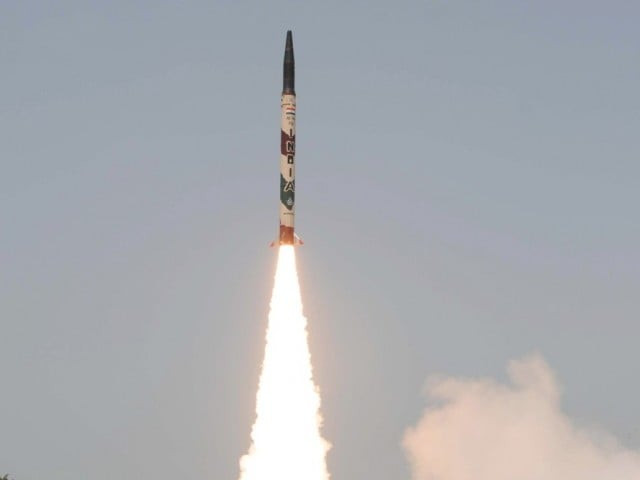Former top military chief terms India's deviation from NFU 'concerning'
Former CJCSC says move to shed doctrine comes at time when Hindutva ideology dominant in India

Former CJCSC says the move to shed the doctrine comes at a time when Hindutva ideology is dominant in India. PHOTO: AFP
"The most dangerous thing is that these pronouncements are coming in the context of Hindutva agenda of the Bharatiya Janata Party (BJP) government," said Chairman Joint Chiefs of Staff Committee (CJCSC) Gen (retd) Ehsanul Haq.
"Otherwise at no stage since the 1998 nuclear tests did Pakistan, at any level, consider Indian pronouncements of NFU credible." Indians are now themselves exposing the falsehood of those claims, said Gen Haq, who also served as the head of Inter-Services Intelligence (ISI).
The remarks come less than two weeks after a leading Indian nuclear strategist claimed the country could launch a preemptive first strike against Pakistan if it feared a nuclear attack was imminent.
India to seal border with Pakistan by 2018: Rajnath
This first strike, however, will not be aimed at urban centres and conventional targets but against Islamabad's nuclear arsenal. The strategic assessment is in clear contrast to New Delhi's No First Use (NFU) policy of 2003.
The former CJCSC was speaking at the launch of Brig (retd) Naeem Salik's book "Learning to Live with the Bomb, Pakistan: 1998-2016," published by Oxford University Press.
This is the first time a senior former official in Pakistan has reacted to the recent indications by Indian scholars, based on statements by top Indian officials, that the country could be moving away from its declared NFU doctrine.
The former general highlighted that the country's attitude under Prime Minister Narendra Modi had turned increasingly belligerent. At the same time Pakistan suffers from discriminatory attitude in the global non-proliferation regime, he said. "Pakistan has to carefully monitor the developments related to the nuclear order and exercise utmost vigilance in safeguarding its legitimate interests."
Islamabad keen on taking forward Pak-India relations through dialogue: Basit
He regretted that despite possessing the nuclear capability, Pakistan still does not exhibit the confidence of a nuclear power in its policies, diplomacy, and national psyche and character. This, he maintained, must change because "while there are many things that could be done to us, there are many things that cannot be done to us."
Dr Salik, who has previously worked with Strategic Plans Division (SPD) and contributed to the establishment of the National Command Authority shed light, in his 352-page book, on the evolution of Pakistan's nuclear doctrine, the establishment of command and control apparatus, and the development of safety and security mechanisms.
This is the second book authored by Dr Salik, who is now associated with Islamabad's Center for International Strategic Studies (CISS) as a senior research fellow.
The launch ceremony also featured reviews by eminent scholars Dr Christine Leah, visiting fellow at CISS, Dr Askari Rizvi, Ambassador Tariq Osman Haider, Mr Ejaz Haider, and Dr Rabia Akhtar.



















COMMENTS
Comments are moderated and generally will be posted if they are on-topic and not abusive.
For more information, please see our Comments FAQ